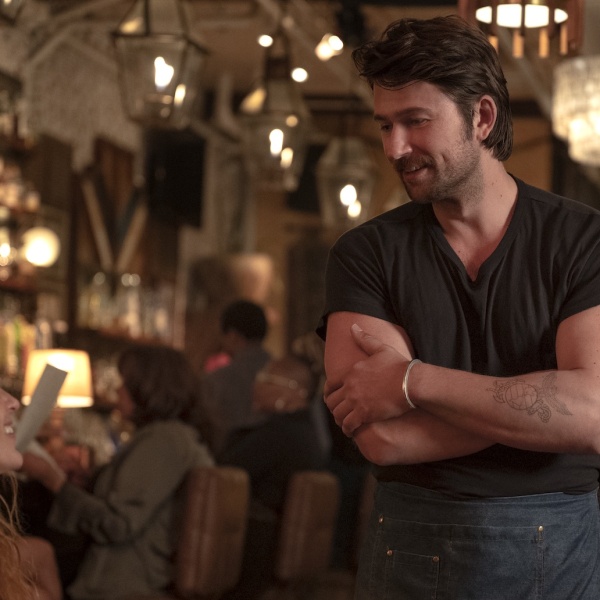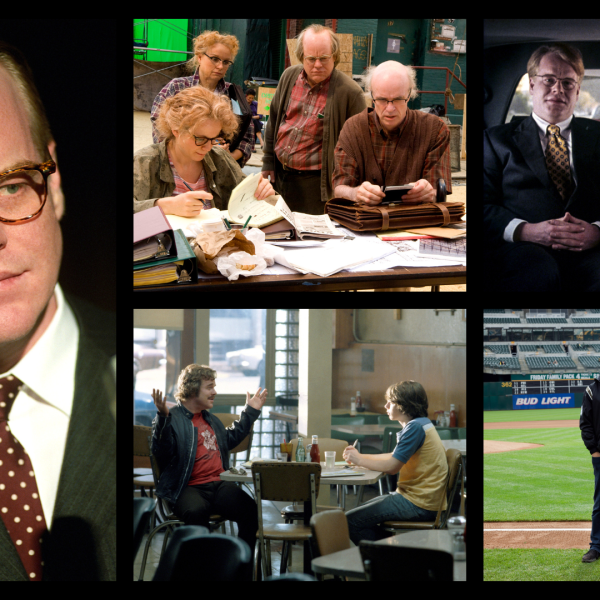From Italy to Canada and Colorado, the fall festivals unleashed a firehose of new films on the international landscape — the majority of which, as is ever thus, are still looking for buyers.
The Venice, Toronto, and Telluride film festivals all hosted plenty of splashy world premieres that attracted early or quick-to-respond buyers, like A24 with “Queer,” “The Brutalist,” and “Friendship,” TIFF opener “Nutcrackers” (Hulu), “Maria” (Netflix), and “September 5” (Paramount). But there are smaller films — and even some bigger, starrier ones from Naomi Watts in “The Friend” to Jude Law and Ana de Armas in “Eden” — still on the hook for stateside distribution.
While there are still plenty of industry-friendly festivals ahead to help locate buyers, like NYFF and AFI Fest, IndieWire rounds up the best films we saw at the fall fests so far that deserve distribution. Somebody, do something about these 22 titles!
Anne Thompson contributed to this story.
“April” (dir. Dea Kulumbegashvili; Venice, TIFF; sales: Goodfellas, CAA)
Georgian filmmaker Dea Kulumbegashvili won critics’ prizes in 2020 for her feature debut “Beginning,” which landed at MUBI. She’s looking for a distributor this year for her harrowing second film, “April,” which won the Special Jury Prize at the 81st Venice Film Festival. Jury president Isabelle Huppert clearly responded to Kulumbegasvhili’s surreal slow cinema drama about an obstetrician in a remote village who performs illegal abortions on the side. The writer/director makes no moral imposition of her own as the doctor’s ethics are called into question, and an intense odyssey (including an unmistakably live birth filmed with great care) into her lonely inner world begins. IndieWire’s David Ehrlich named it one of the best films of Venice.
“Broken Rage” (dir. Takeshi Kitano; Venice; sales: Amazon MGM Studios / Amazon)
Japanese actor/filmmaker Takeshi Kitano’s yakuza parody “Broken Rage” bowed at Venice to strong reviews. As IndieWire critic Ben Croll wrote, “As if the very title didn’t give away the game, ‘Broken Rage’ never lives up to its central conceit. Nor does it try to, not that the director particularly cares, and neither should any of us, because the film that Takeshi Kitano actually delivered is all the more delightful. Promising a kind of diptych that starts as a gritty Yakuza flick before doubling back to redo the same scenes for farce, the film plays as a more elemental game of set-up and payoff, giving viewers — and itself — the most loving possible raspberry and the least-toxic troll. That Kitano does all that in just an hour’s length endears even more. We should be so lucky to have broken promises this sturdy.”

“Cloud” (dir. Kiyoshi Kurosawa; Venice; sales: Nikkatsu Corporation)
Kiyoshi Kurosawa is rightfully back in the Western conscience thanks to newfound attention toward his 1997 serial killer classic “Cure,” a film that drew comparisons to “Longlegs.” The “Pulse” director switches gears with the high-octane action movie “Cloud,” a Venice premiere. As David Ehrlich wrote, the film “leverages the social disaffection at the heart of his analog horror masterpieces into a sterile — but eventually bullet-filled — morality tale about the dehumanizing nature of digital communication. The first hour is a slow accumulation of the petty crimes (and other various insults) that the internet allows people to commit against one another from a distance, and with the benefit of anonymity. The second hour observes what happens when those petty crimes reach a critical mass, and the animus that’s been welling up on social media spills into the real world with the deadly force of a double-barreled shotgun.”
“Daughter’s Daughter” (dir. Huang Xi; TIFF; sales: Andrews Film Ltd.)
Starring Taiwanese icon Sylvia Chang, “Daughter’s Daughter” follows a mother struggling with what to do with her deceased daughter’s healthy embryo. As IndieWire wrote out of TIFF, where reviews were high, “the film elegantly explores the blurred lines between selflessness and selfishness, through a tale of modern motherhood that poses complex questions of responsibility when faced with sorrow.” “Daughter’s Daughters” counts Chang and master filmmaker Hou Hsiao-hsien as executive producers.

“Diciannove” (dir. Giovanni Tortorici; Venice, TIFF; sales: Playtime)
Luca Guadagnino discovered Gen Z Sicilian filmmaker Giovanni Tortorici when he worked as an assistant director on Guadagnino’s HBO miniseries “We Are Who We Are.” Tortorici’s Venice Horizons premiere “Diciannove” is an exuberantly directed coming-of-age story about a 19-year-old (hence the title) on a journey from a dead-end stint at business school to discovering his love of the Italian classics — and beautiful men and women. It’s a slice-of-life in Antoine Doinel mode that deserves a supportive home at an arthouse distributor or streamer.
“Diva Futura” (dir. Giulia Louise Steigerwalt; Venice; sales: Piperfilm)
Set in Italy at the turn of the 1980s and into the 1990s, this stylish Venice premiere centers on the porn movie studio of the same name, with Pietro Castellitto as its founder, Riccardo Schicchi. As IndieWire wrote, “The sun-dappled warmth and sumptuous compositions of director Giulia Louise Steigerwalt’s filmmaking reflect the agency’s ambition to find exquisite what is labeled grotesque by the moral arbiters of the era. The director’s approach is not concerned by eschewing the male gaze on this industry.”
“Don’t Let’s Go to the Dogs Tonight” (dir. Embeth Davidtz; Telluride; sales: CAA)
South African actress Embeth Davidtz (“Schindler’s List”) understood how to make a film of Alexandra Fuller’s 2001 bestseller showing the 1980 Rhodesian civil war from the POV of a white seven-year-old girl (rookie Lexi Venter) living on a rustic farm with her sister and parents. After others tried and failed, she figured out that the child was the entryway into the movie. The film won raves at Telluride, but is still seeking distribution. —AT

“Eden” (dir. Ron Howard; TIFF; sales: CAA, AGC Studios)
A Ron Howard joint on the hook for distribution? Stranger things have happened. The survival thriller about white Euro settlers in the Galapagos boasts a starry cast including Ana de Armas, Vanessa Kirby, Sydney Sweeney, and Jude Law. Reviews were mixed out of Toronto, but “Eden” has a fan in IndieWire, with Kate Erbland writing, “What we do get from Howard’s latest is a strong reminder of his handle on not just craft and casting, but also story and tone. No film about the utter demise of a supposed utopia — a real one, to boot! — and the utter infallibility of human beings should be this fun, but we’re lucky this one is. It helps the hard truths go down easier, especially about who we all are as people (you know, hellish).”
“Familiar Touch” (dir. Sarah Friedland; Venice; sales: Memento)
Sarah Friedland — a filmmaker and body movement coach for aging adults — eschews cliche and sentimental to show how degenerative illness affects a once-vibrant woman named Ruth (an excellent Kathleen Chalfant). As IndieWire wrote, “With this film, Friedland wants to challenge notions of how older adults become peripheral in our culture — she based the film around a paternal grandmother who died 12 years ago but also grappled with dementia. By the time she died, Friedland’s relatives had already prematurely mourned her death.” In the Horizons section at Venice, “Familiar Touch” won Best Director, Best Actress, and the Lion of the Future Award for a Debut Film.
“The Friend” (dirs. David Siegel and Scott McGehee; Telluride, TIFF; sales: CAA)
One of the more audience-friendly movies with heart at Telluride, David Siegel and Scott McGehee’s equity-financed “The Friend” stars Naomi Watts as a writer grieving for her late mentor (Bill Murray), as she adopts the Great Dane named Bing that he left behind. Inevitably, she starts to write about her new best friend. Adapted from Sigrid Nunez’s beloved 2018 novel, the movie is also charming, witty, and moving. Worldwide rights are available. —AT

“Harvest” (dir. Athina Rachel Tsangari; Venice, TIFF; sales: The Match Factory)
Greek filmmaker Athina Rachel Tsangari (“Harvest,” “Chevalier”) adapts a Jim Crace (“Being Dead”) novel about an Agrarian community in the Middle Ages that unravels over seven hallucinatory days. Tsangari directs Caleb Landry Jones, Harry Melling, and Rosy McEwen in this portrait of economic turmoil, shot by indie stalwart DP Sean Price Williams. IndieWire wrote, “Where lauded contemporary Yorgos Lanthimos makes his characters suffer to drive existential points home, Tsangari uses deadpan observations as a way to affectionately deepen her psychological portraits. Crucially, her creations care about each other, even if they are often hamstrung by certain weaknesses.”
“The Last Showgirl” (dir. Gia Coppola; TIFF; sales: Goodfellas, CAA, Utopia)
A Gia Coppola joint starring an unvarnished Pamela Anderson in a career-defining performance shouldn’t expect to languish on the festival circuit for too long without a buyer. Repping U.S. sales is Utopia, co-run by Coppola family member Robert Schwartzman. The company jumped in to co-distribute Francis Ford Coppola’s “Megalopolis” with Lionsgate. Will they also be willing to again skew nepositic and ultimately distribute Gia Coppola’s new film as well? Here, Anderson plays a Las Vegas showgirl who’s informed her long-running Nevada show will end in two weeks — but what does the future look like when your only skill has been dancing all these years? IndieWire’s Kate Erbland wrote out of TIFF: “While ‘The Last Showgirl’ follows Shelly as she deals (and, often, doesn’t) with the fallout from a lifetime spent blazing her own trail, Coppola’s film seems destined and designed to do the opposite for Anderson: to open up an entirely new series of possibilities for the actress. ‘The Last Showgirl’ is both the role of a lifetime for Anderson, one that can fully capture her incredible emotional intensity and vulnerability, and (we can only hope) the start of a brand new career for her.”

“The Life of Chuck” (dir. Mike Flanagan; TIFF, sales: FilmNation Entertainment)
Few pundits expected horror maestro Mike Flanagan’s science-fiction Stephen King adaptation, “The Life of Chuck,” to win the TIFF People’s Choice Award — a top prize that usually presages Oscar contention. The uplifting film, a detour from the gothic worlds Flanagan created for Netflix, follows Tom Hiddleston as an ordinary accountant across three chapters in his life. With the TIFF imprimatur, this film, co-starring Mark Hamill and Chiwetel Ejiofor, should find a home soon.
“The Luckiest Man in America” (dir. Samir Oliveros; TIFF; sales: CAA)
Starring Paul Walter Hauser, this stranger-than-fiction drama resurrects the popular ’80s game show “Press Your Luck” — and the unemployed ice cream truck driver turned folk hero who sparked a turning point in television history. “Unfolding almost exclusively on the CBS lot where the game show was taped, the film treats the producers’ quest to figure out his impossible knack for the game with all the seriousness of a Secret Service counterfeiting operation. At the same time, its candy colored set and ’80s game show kitsch prevent audiences from ever forgetting about the asininity of the setting,” IndieWire wrote.
“Mistress Dispeller” (dir. Elizabeth Lo; Venice, TIFF; sales: Anonymous Content, Submarine Entertainment)
“Stray” director Elizabeth Lo returns with a delicate portrait of marriage and what threatens it in China — and the cottage industry of women eager to help. As IndieWire wrote out of Venice, “This look at a love triangle from all sides focuses on a novel profession that is perhaps only offered in China, where the movie plays out: The titular dispeller is a woman hired to break up extramarital affairs, getting to the root of the infidelity by befriending husband, wife, and mistress, only to remind said husband and wife why they got together in the first place. And should stay together. And perhaps how the husband’s transgression can bring them closer to a newfound peace.”
“On Falling” (dir. Laura Carreira; TIFF; sales: Goodfellas)
One of IndieWire’s most passionate reviews out of TIFF was for Portuguese writer/director Laura Carreira’s social-realist character study about an immigrant facing poor working conditions in Scotland: “We are dropped in with Aurora (Joana Santos) as she shows up to work as a packer at a Scottish factory. Carreira has a docu-realistic eye for setting and a dramatist’s instinct for pacing and mood. The pitter-patter of workers footsteps, the squeaking of a metal turnstile gate, the beeping of Aurora’s scanner — a tool of her trade — form a rhythm so that there is an assured quality that marks the film as a work by someone who has not fallen into the trap of thinking that social realism means no production values. Instantly, there is a charge to events despite the fact that the film is painstakingly fashioned from plausible locations and scenes are allowed to breathe.”

“On Swift Horses” (dir. Daniel Minahan; TIFF; sales: UTA, Black Bear)
A queer-infused Western drama starring Daisy Edgar-Jones, Jacob Elordi, Will Poulter, Diego Calva, and Sasha Calle seems like a horseshoe-in for distribution. Some reviews out of TIFF for “On Swift Horses,” which counts Killer Films among its producers, were mixed despite internet drooling over love scenes between Elordi and “Babylon” breakout Calva. But IndieWire loved the film, with Christian Zilko calling longtime television director Daniel Minahan’s (“Deadwood,” “Six Feet Under,” “Fellow Travelers”) narrative feature debut “a stunning tableau of almost-romances, weaving together ephemeral moments of magic with the pain that inevitably follows when the universe takes them away.”
“Riefenstahl” (dir. Andres Veiel; Venice; sales: Beta Cinema)
Filmmaker Andres Veiel offers a compelling and chilling overview of the life and career of Nazi propagandist Leni Riefenstahl, best known for the Hitler-commissioned “Triumph of the Will” and “Olympia,” her portrait of the 1936 Summer Olympics in Berlin. Wedding her artistic legacy to her ties to the Nazi regime, “Riefenstahl” holds its subject’s feet to the fire with damning archival footage that frames her almost as a desperate Norma Desmond type, addicted to the spotlight and in denial about her fading status in the world, while covered in garish makeup. Original music by Freya Arde brings an unsettling horror movie dimension to the awful inevitabilities onscreen. Distributors may not want to touch a movie about Nazism and its legacy — but they should be brave, and put this harrowing documentary out into the world.
“Separated” (dir. Errol Morris; Telluride; sales: Submarine Entertainment)
As IndieWire Editor-at-Large Anne Thompson wrote, documentary master Errol Morris’ hard-hitting nonfiction portrait of Trump’s child separation policy, “Separated,” deserves a release before the November election. Based on NBC reporter Jacob Soboroff’s book “Separated: Inside an American Tragedy,” the movie was backed by NBC News, yet a Peacock or Focus Features release hasn’t been in the cards to this point. “While the movie doesn’t follow the book, it does take from it the composite central story of a Guatemalan woman and her teenage son making the arduous trek to the U.S./Mexico border, where they are detained and separated,” Thompson wrote. IndieWire also gave the film a Critic’s Pick review out of Telluride.
“Sharp Corner” (dir. Jason Buxton; TIFF; sales: Range Media Partners, Neon)
Jason Buxton’s Nova Scotia thriller gives Ben Foster a strong showcase as a man grappling with an existential crisis. After a car accident damages the new home he shares with Cobie Smulders, he becomes obsessed with devoting his life to helping the victims. As IndieWire’s Christian Blauvelt wrote, Buxton’s film “refuses to explain itself. There are a lot of different readings you could apply here, but there’s still a pervasive novelistic ambiguity that defies any one interpretation.”

“Vice Is Broke” (dir. Eddie Huang; TIFF; sales: UTA)
Eddie Huang undertakes a first-person look into media empire Vice’s rise and fall, from a Montreal indie magazine to a controversial giant that plummeted into bankruptcy last year. That Huang is a former Vice media staffer himself — host of the former travel show “Huang’s World” — lends the doc even more immediacy and privileged access. IndieWire’s David Ehrlich wrote: “‘Fresh Off the Boat’ creator Eddie Huang, a writer, director, and TV chef who hosted four seasons of his own Vice travel show, had a front-row seat to see the whole thing wobble off its axis. In a way, that makes him the perfect person to create the definitive documentary about the rise and fall of Vice, just as it makes his film — which is much less interested in hard-hitting detail than it is in keeping it real — the perfect encapsulation of the media empire that it watches crumble into dust.”
“Zurawski v Texas” (dirs. Maisie Crow and Abbie Perrault; Telluride; sales: WME)
Hillary and Chelsea Clinton, along with actress Jennifer Lawrence, produce this incisive documentary look behind the curtain of Texas abortion laws, which was well-reviewed out of Telluride. As IndieWire wrote, “Zurawski v Texas” is “a film about America itself and the governmental failings that have brought us to this moment. In the two years since the Supreme Court’s overturning of Roe v. Wade, women and pregnant people have struggled to receive proper reproductive care. This urgent and necessary documentary makes plain the obvious evil of an uncaring government that insists on gaining full control of the bodies of its people, unmoved by the pain that follows.”







